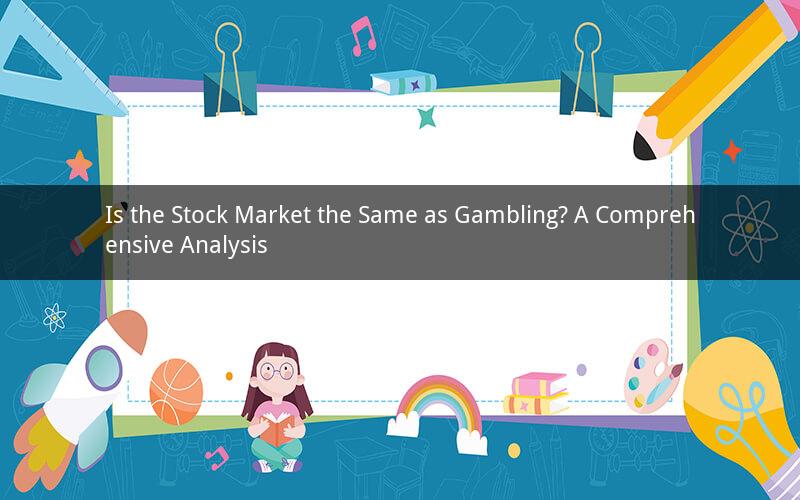
Introduction:
The stock market has long been a topic of debate, with many people comparing it to gambling. While both involve risk and the potential for financial gain, there are significant differences between the two. This article aims to explore the similarities and differences between the stock market and gambling, providing a comprehensive analysis to shed light on this intriguing comparison.
I. Similarities between the Stock Market and Gambling
1. Risk and Uncertainty:
Both the stock market and gambling involve risk and uncertainty. In the stock market, investors face the risk of losing their investment if the market takes a downturn. Similarly, gamblers risk losing their money when placing bets on games of chance.
2. Potential for Financial Gain:
Both the stock market and gambling offer the potential for financial gain. Investors in the stock market can earn profits through capital appreciation or dividends, while gamblers can win money by placing winning bets.
3. Luck Factor:
Both activities rely on an element of luck. In the stock market, luck can play a role in the timing of market movements, while in gambling, luck determines the outcome of each game.
II. Differences between the Stock Market and Gambling
1. Skill and Knowledge:
The stock market requires a significant amount of skill and knowledge to succeed. Investors must analyze financial statements, study market trends, and make informed decisions based on their research. In contrast, gambling primarily relies on luck and chance, with limited room for skillful play.
2. Long-term Strategy:
The stock market is a long-term investment vehicle, requiring patience and discipline. Investors often hold their investments for years, aiming for sustainable growth. On the other hand, gambling is typically a short-term activity, with gamblers placing bets with the hope of winning quickly.
3. Regulation and Transparency:
The stock market is heavily regulated, ensuring transparency and fairness. Regulatory bodies such as the Securities and Exchange Commission (SEC) oversee the market, protecting investors and maintaining market integrity. In contrast, gambling regulations vary by country and can be less stringent, leading to potential issues of fairness and corruption.
III. The Psychological Aspect
1. Addiction:
Both the stock market and gambling can be addictive. The thrill of potential gains and the psychological aspect of winning can lead individuals to become hooked on these activities. However, the long-term consequences of addiction can be more severe in the stock market, as it can lead to significant financial loss.
2. Emotional Control:
Emotional control is crucial in both the stock market and gambling. Investors must remain calm and rational, avoiding impulsive decisions driven by fear or greed. Similarly, gamblers must control their emotions to avoid making irrational bets.
IV. Conclusion
In conclusion, while the stock market and gambling share some similarities, such as risk and the potential for financial gain, they differ significantly in terms of skill, knowledge, and long-term strategy. The stock market requires a disciplined approach and a thorough understanding of financial markets, while gambling relies heavily on luck and short-term decision-making. Understanding these differences is crucial for individuals looking to participate in either activity responsibly.
Questions and Answers:
1. Q: Can investing in the stock market be considered a form of gambling?
A: While there are similarities, investing in the stock market is generally not considered gambling. It requires research, analysis, and a long-term perspective, whereas gambling is more about luck and short-term gains.
2. Q: Is it possible to make a living from the stock market?
A: Yes, it is possible to make a living from the stock market. However, it requires skill, knowledge, and a disciplined approach. Many successful investors have made a substantial income through long-term investments and strategic trading.
3. Q: What are the risks involved in the stock market?
A: The stock market involves risks such as market volatility, economic downturns, and company-specific issues. Investors must be prepared for potential losses and be willing to ride out market fluctuations.
4. Q: Can investing in the stock market be addictive?
A: Yes, investing in the stock market can be addictive, especially for individuals who experience the thrill of potential gains. It is important to maintain emotional control and avoid making impulsive decisions driven by greed or fear.
5. Q: How can one differentiate between gambling and investing in the stock market?
A: The key difference lies in the level of skill, knowledge, and long-term strategy involved. Investing in the stock market requires research, analysis, and a disciplined approach, while gambling is primarily based on luck and short-term decision-making.